Real Estate Brilliance in Pakistan: Navigating Challenges and Opportunities

Introduction
“Real estate refers to the land along with any enduring structures, such as residences, or lasting enhancements that are affixed to the land, whether they occur naturally or are constructed by humans”
Different categories of real estate exist like residential real estate; encompasses properties intended for housing purposes, like single-family houses, cooperatives, duplexes, townhouses, etc. Second, commercial real estate; pertains to properties solely designated for business operations, such as apartment complexes, gas stations, grocery stores, hospitals, hotels, offices, etc. Third, industrial real estate; properties employed for manufacturing, production, distribution, storage, research, and development activities. Last but the least land in general; which incorporates undeveloped land, vacant properties, and agricultural expanses like farms, orchards, ranches.
Throughout Pakistan's history, the real estate industry has played a noteworthy role in bolstering the nation's economy. Over time, this market has displayed phases of expansion and reliability, alongside instances of instability and speculative behaviour. In recent years, real estate has emerged as an enticing opportunity within Pakistan, gathering attention from numerous influential business leaders. What sets the real estate sector apart is its distinctive fusion of minimal investment risk with the potential for substantial profit gains, making it an attractive destination for substantial capital inflows.
The real estate field's capacity for noteworthy profits coupled with its relatively low demand for entrepreneurial endeavours has generated significant interest among overseas Pakistanis. Unique traits within the real estate industry set it apart from conventional sectors. Importantly, this sector necessitates substantial initial investments, resulting in returns that outperform typical enterprises. Consequently, this mechanism accelerates income expansion for individuals already enjoying higher earnings.
This article aims to capture the essence of real estate industry situation in Pakistan in the current time period as well as highlighting the challenges being faced, hindering the industry to reach its full potential.
Challenges in Pakistan's Real Estate
The real estate sector in Pakistan is currently grappling with a range of pressing challenges that demand immediate attention. A conspicuous problem within this industry is the prevailing lack of transparency, impeding well-informed decision-making for buyers, sellers, and investors alike. This opacity often results in conflicts, fraud, and related predicaments.
Persistent issues such as unclear property documentation, disputes over land ownership, and unreliable titling systems continue to plague the sector. These dilemmas frequently lead to legal disputes, obstructing property transactions. Despite attempts to regulate speculative buying and enhance tax collection, the enforcement of these regulations remains inconsistent. This inconsistency fosters an environment where certain practices evade oversight, thereby unsettling market stability.
Unplanned and rapid urbanization in many Pakistani cities has given rise to a host of challenges including congestion, inadequate infrastructure, and substandard housing conditions. Affordable housing units, especially for the lower-income strata of society, remain in short supply. Escalating inflation has made even renting accommodations unaffordable for this segment of the population. And even when housing projects are developed, they often lack basic amenities like water supply, sewage systems, and proper road networks.
The protracted bureaucratic procedures and delays in acquiring essential approvals and permits pose obstacles to real estate development ventures, leading to escalated costs. A notable fraction of real estate transactions in Pakistan occurs through informal channels, frequently involving cash exchanges. This practice facilitates tax evasion, money laundering, and complicates the tracking of market trends.
These issues collectively contribute to economic instability, directly impacting the real estate sector. The consequences include economic downturns, currency fluctuations, and price volatility. An additional concern is the sector's disregard for environmental repercussions stemming from construction and deforestation. This negligence can result in challenges tied to waste management, pollution, and the depletion of resources. Addressing the challenges within Pakistan's real estate industry necessitates a comprehensive approach that presents contextual understanding, relevant data, and potential solutions for each of these multifaceted issues.
The Bright Side of Pakistan's Real Estate
Pakistan's real estate sector has played a substantial role in the country's economic advancement. According to World Bank estimates, real estate assets constitute a significant portion of a nation's wealth, roughly 60 to 70%. If applied to Pakistan, this would peg the sector's size at around $300 to $400 billion. Driven by urban migration and a population growth rate of 2.4%, the demand for housing is continuously rising. In the 2021-22 period, the Real Estate Activities segment observed a growth of 3.7%. Construction holds a notable 13.4% share in the industry, and its value-added aspect is primarily influenced by construction-related expenses from other industries. Despite a modest 3.1% growth rate in construction, mainly due to increased government spending, there was an unexpected 30.1% rise in the relevant deflator (WPI building material). Employment in the construction sector increased from 8.0% in FY2019 to 9.5% in FY2021. In Private Sector Gross Fixed Capital Formation (GFCF), Real Estate activities claim the second-highest share of 18%, compared to 15% in FY2016. The growth of private sector GFCF in real estate activities was 35%, mainly attributed to a higher deflator growth. In terms of shares, Real Estate Activities (OD) constitute 9.6% in services and 5.6% in GDP. Meanwhile, the Construction sector accounts for 2.56% of GDP.
Despite encountering financial, economic, and political hurdles, the real estate sector's performance was lacklustre in 2019. However, there's optimism for a robust rebound in 2020. Political instability and uncertain economic policies led to a slowdown in real estate from 2017 onwards. Various factors, such as lack of incentives for investors, property purchase restrictions for non-filers, stringent banking controls for non-filers by the Federal Board of Revenue (FBR), and high property transfer taxes, discouraged investments in 2018-19. Additionally, the underutilization of development budgets resulted in contraction within the construction sector, subsequently affecting the real estate industry.
The Labour Force Survey 2020-21 revealed a rise in employment within the construction sector, reaching 6.4 million from 5.13 million in 2018-19, indicating a growth of 1.28 million employed individuals. The construction sector's backward and forward linkages influence nearly 40 allied industries, underscoring its role in both GDP growth and job creation.
Previously, the FBR targeted non-filers by restricting property purchases exceeding $5 million unless they registered with the Federal Revenue Board. Strict controls on non-filers' banking transactions and substantial property transfer taxes further dissuaded investments in 2018-19. These limitations have now been lifted, allowing non-filers to contribute significantly to the real estate sector's growth and indirectly impacting the broader economy. The outlook for Pakistan's real estate in 2022 appears promising, signalling a positive trajectory for the sector's future.
Elaan Research Centre Law Conference 2023
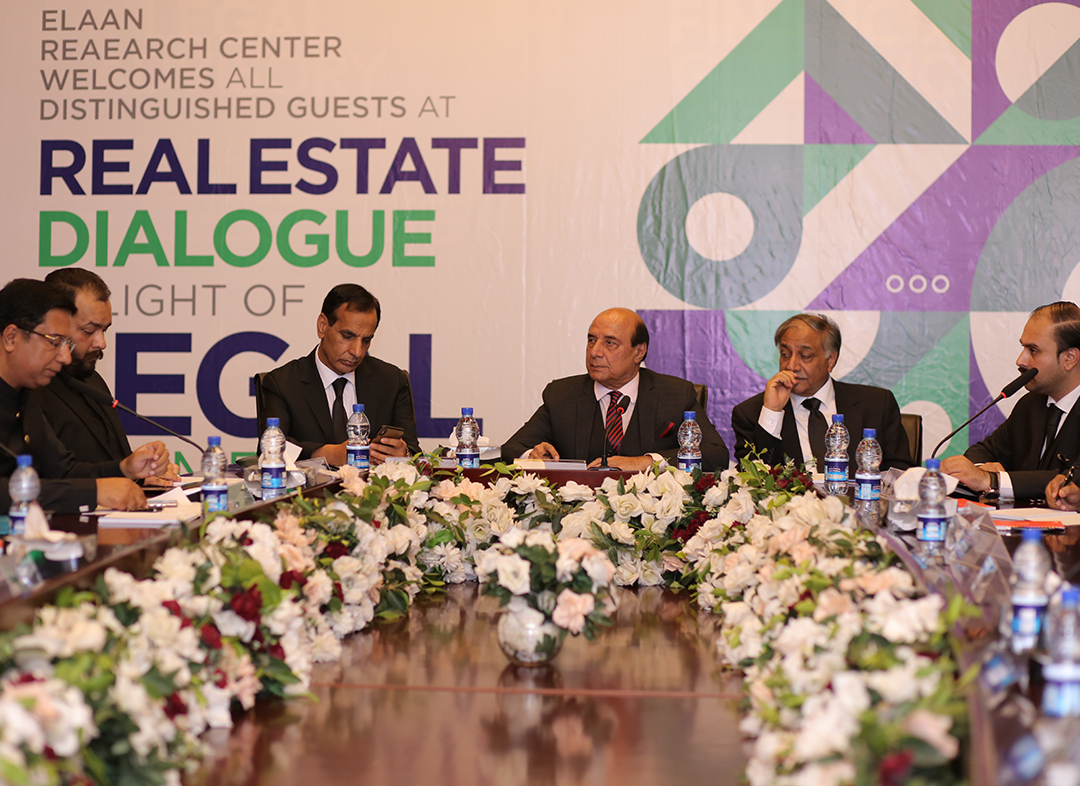
On the 17th of July 2023, a ground breaking legal conference named the "Real Estate Conference in the light of legal framework" took place at the Pak China Centre. The event was the inaugural conference of the Elaan Research Centre. The primary objective was to convene legal and governmental representatives to deliberate on crucial matters pertaining to the real estate sector and to formulate relevant policies.
Mr. Zaildar Ahsan Shah, Advocate High Court of Pakistan, initiated the discussion forum by expressing his gratitude to the esteemed participants for dedicating their time to engage in a conversation about the prevalent challenges within the real estate sector. He elaborated on the multifaceted issues afflicting Pakistan's real estate industry, including deceptive marketing tactics, corrupt conduct, inadequate record keeping, and haphazard construction practices. He earnestly called upon all attendees to engage in a constructive discourse and propose actionable policies that could be incorporated into the legal framework.
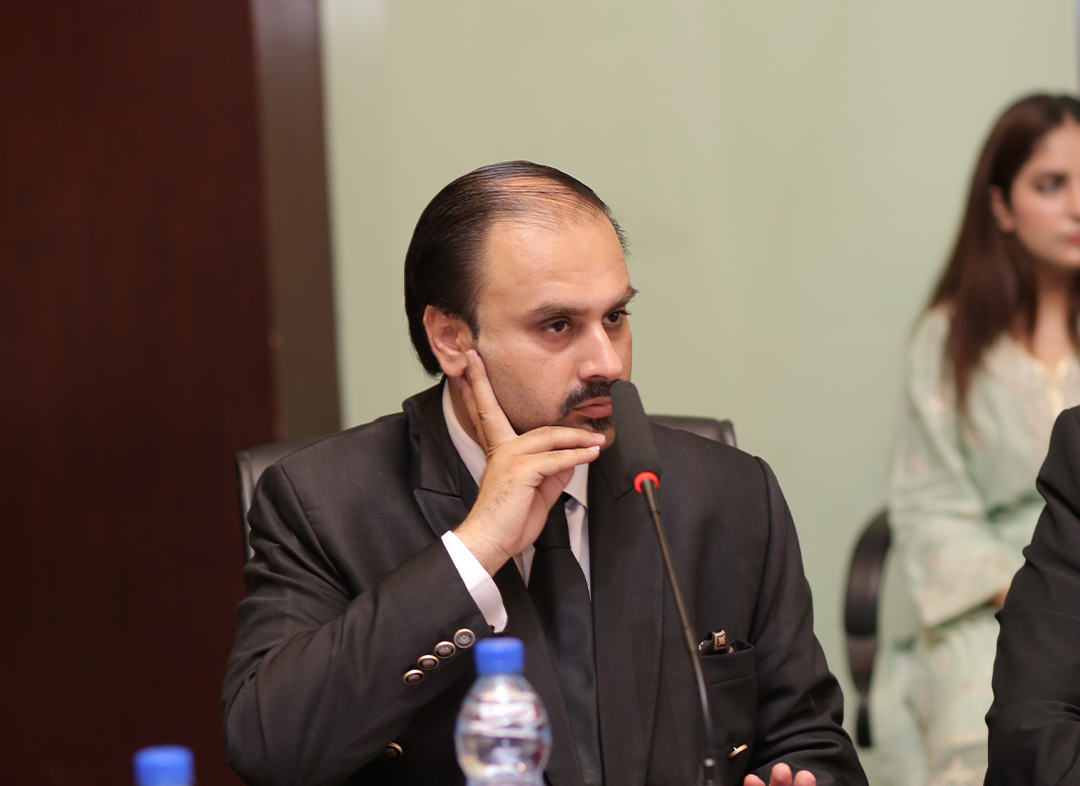
The central focus of this maiden conference organized by the Elaan Research Centre was to propose a legal framework for the real estate sector. Approximately 30 delegates from the legal and governmental spheres participated, with distinguished Chief Guest Sardar Latif Khosa, Senior Advocate Supreme Court of Pakistan, Former Governor, Jahangir Jadoon, Advocate General Islamabad and Guest of Honour Anjum Aqeel Khan, Leader PMLN, gracing the event.
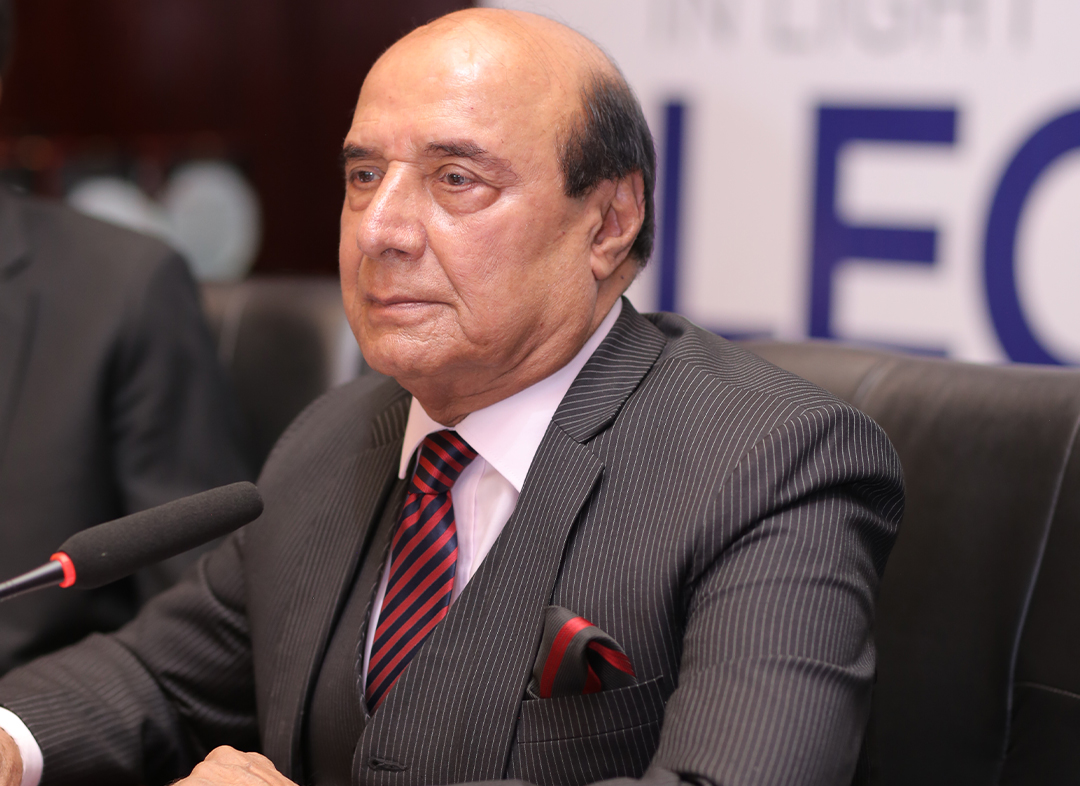
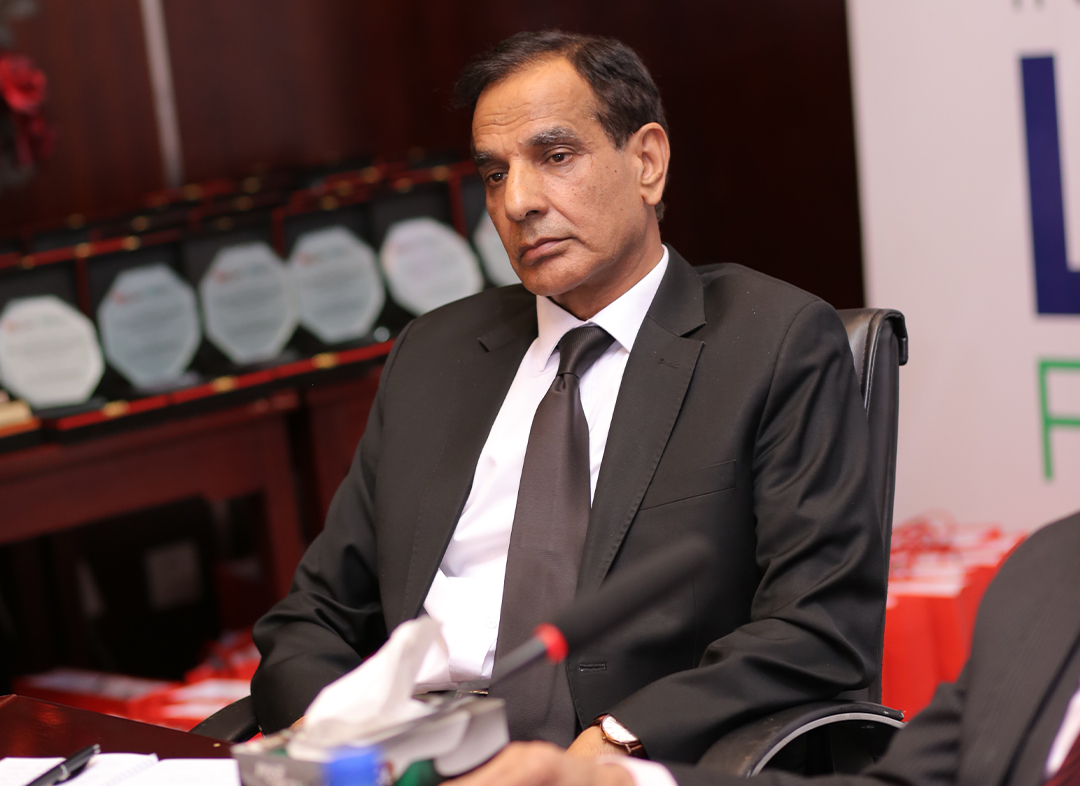
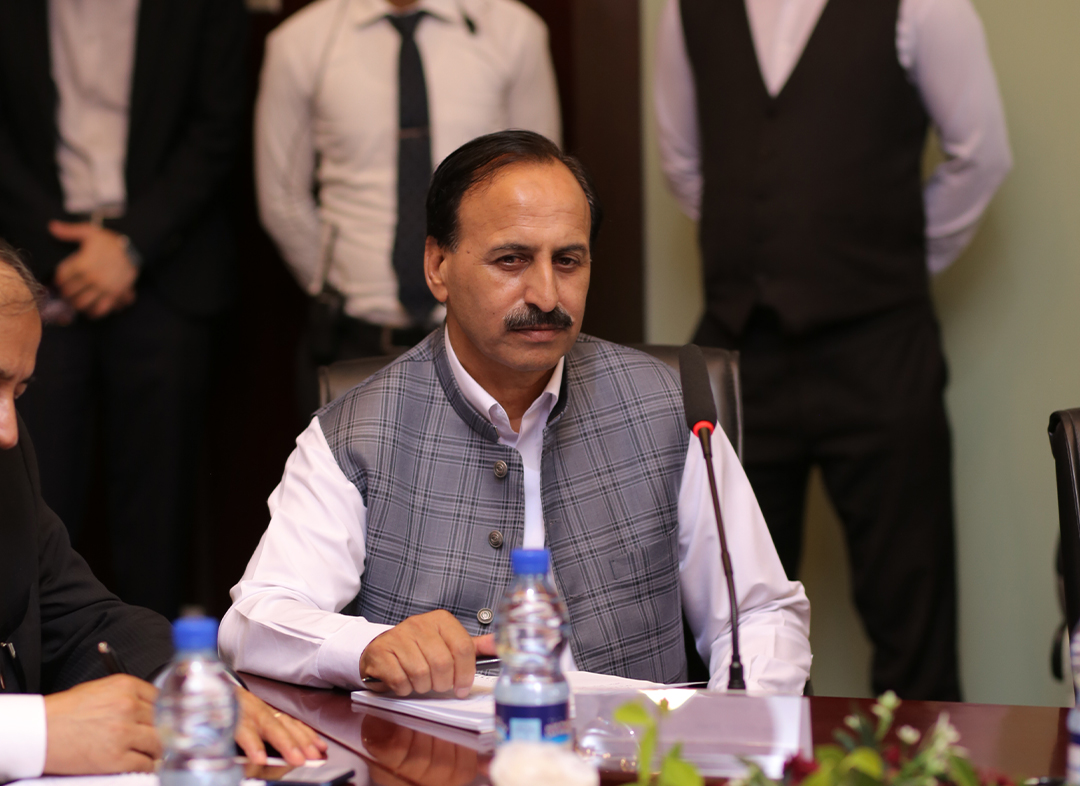
A diverse array of pressing issues came under discussion during the conference. Matters such as deceptive marketing, unlawful construction, and conversion of agricultural land for commercial purposes, flawed documentation systems, and corrupt practices were scrutinized. Attendees contributed their valuable insights on the challenges and potential solutions. For instance, Mr. Syed Amjad Ali, Director Marketing Jang Media Group, stressed the necessity of a robust framework applicable across society segments to safeguard them from housing society scams and deceptive marketing. Riasat Ali Azad, ASC, Former President Islamabad Bar Associate, highlighted the issue of agricultural lands being used for housing construction, which is causing food security problems in the country. On the other hand, Syed Qamar Sabzwari, Member Islamabad Bar Council, stressed on the need to have a just filling system; regulators need to be held accountable for poor follow ups and weak background checks.
Overseas Pakistanis emerged as a particularly affected group, targeted by deceptive marketing, thereby causing setbacks in foreign investments. The consensus among many attendees was the urgent requirement for a dedicated regulatory body overseeing paperwork and providing guidelines to regulators. Mr. Muhammad Shoaib Razzaq, Advocate Supreme Court of Pakistan, aptly pointed out that the issue often lies within the regulators themselves, implying that the state needs to enforce existing legislation. Mr. Obaid Ayub, Director of House of Elaan, delved into the impact of increased government taxes on the real estate industry. Mr. Raja Muhammad Aleem Khan Abbasi, Vice Chairman Islamabad Bar Council, advocated for ethical considerations within the sector and the prevention of agricultural land conversion for commercial purposes.
Mr. Saeed Ahmed Malik (Deputy Secretary, State Ministry of Housing) questioned the timing of housing authorities' interventions, suggesting a proactive approach. Mr. Adil Aziz, Chairman Inter Provincial Bar Council Committee Islamabad Bar Council, stressed proper documentation by regulators and the implementation of deceptive marketing laws from the 2020 housing act. The issue of housing schemes delivering less land than initially promised was discussed extensively by Mr. Haroon ur Rashid, Vice Chairman Pakistan Bar Council, and Mr. Hassan Raza Pasha, Chairman Executive Committee Pakistan Bar Council. Mr. Pasha proposed involving lawyers in property matters to ensure accountability, credibility and transparency. He further emphasized on the fact that law enforcement agencies alone cannot bring the change, rather every citizen should be responsible for bring the change.
Guest of Honour Mr. Anjum Aqeel Khan, Leader PMLN, acknowledged the significance of the real estate industry and underscored the need for a robust regulatory body to enforce existing laws. To conclude the conference, Chief Guest Mr. Sardar Latif Khosa commended the initiative and urged collective responsibility in addressing real estate challenges, highlighting that Pakistan is the shared homeland of all involved parties. He emphasized the need for immediate action regarding these issues and the need to take responsibility of our actions.
Mr. Ovais Ali Khokhar, the Chief Executive Officer of House of Elaan, delivered the concluding remarks. He commenced by extending his heartfelt appreciation to all the participants for their valuable time and contributions to the discussion. He noted that the insightful suggestions shared during the dialogue would be considered for future actions by law enforcement authorities. Additionally, he announced the establishment of the Elaan Research Centre, emphasizing its role in shedding light on pertinent social and economic issues, with a particular focus on real estate, such as the one discussed that day. Mr. Khokhar expressed his satisfaction in receiving such positive feedback from the attendees and their shared enthusiasm for instigating meaningful change.

Conclusion
The article highlights the current state of Pakistan's real estate sector, focusing on the challenges it faces and the need for a dedicated regulatory body to address these issues. Deceptive marketing practices and the inefficiency of existing regulatory bodies are eroding trust in the industry. To counter this, there's a call for the establishment of a specialized regulatory body to restore trust and repair the sector's reputation. It emphasizes a sense of responsibility toward Pakistan as a homeland and the importance of taking steps to improve the situation. In response to these challenges, House of Elaan has initiated the Elaan Research Centre. This centre aims to provide accurate information and research to educate the public and prevent them from falling victim to scams.
Additionally, the article mentions that Elaan Research Centre plans to organize conferences in the future. These conferences have a twofold purpose: to highlight important issues within the real estate sector and to collaboratively develop solutions for these challenges. The overall goal is to bring about positive change and improvement within the industry.
In summary, the article addresses the challenges and issues in Pakistan's real estate sector, particularly deceptive marketing practices and regulatory inefficiencies. It proposes the creation of a dedicated regulatory body to address these concerns and restore trust. The establishment of Elaan Research Centre and its initiatives, including information dissemination and conferences, are presented as steps toward educating the public and driving positive change within the sector.
Mr. Khalid Taimur Akram is a renowned expert of International Relations. He has the unique honour of being declared as “Best IR Expert” by Communication University of China, Beijing in year 2021 & 2022. HE is also the receipt of the highest literacy and “Oltan Qalam”, which was bestowed on him by the government of Republic of Uzbekistan, in year 2022. He was also declared as the “Best Writer” in Republic of Azerbaijan. Currently, he is Director of International Academic Network for a Community with Shared Future (IAN-CSF) at Communication University of China in Beijing. He is working as expert with various think tanks those in Pakistan, China, Turkey, Romania, Hungary, Belarus, Russia, Uzbekistan, Kazakistan, Tajikistan, Kyrgyz Republic and Indonesia. He also had been overseeing the Electoral process in many countries as “International Election Observer”.







